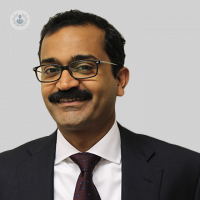How to manage premenstrual syndrome (PMS): lifestyle, medication and surgery
Written by:Premenstrual syndrome (PMS) is the name given to both physical and emotional symptoms that can affect daily life in the two weeks before you have your period. It disappears or diminishes by the end of your period.

PMS affects around 30 per cent of women
PMS can affect any woman during her childbearing years. Around 30 per cent of women can experience moderate to severe symptoms. Furthermore, there is PMDD (premenstrual dysphoric disorder), which is the American Psychiatric Association’s definition of a type of severe PMS.
The cause of PMS
We don’t know exactly why some women suffer from PMS. Some women are more sensitive to hormonal changes during their cycle, but it may also be due to chemical substances in the blood called neuro-transmitters.
Symptoms of PMS
Almost all women have some premenstrual symptoms. The common symptoms include:
- Changes in mood
- Feeling one or more of the following: depressed, irritable, bad-tempered, anxious, emotional
- Tiredness
- Headaches
- Feeling bloated
- Sometimes, there can be changes to the skin or hair
Diagnosing PMS
Diagnosis depends on the timing of the symptoms with the menstrual cycle. If you are suffering from PMS, write the symptoms you are having in a diary for at least 2 cycles. Your GP or gynaecologist can review your diary. If the diary is not enough for the correct diagnosis, a trial of treatment with GnRHa may help point us in the right direction. There are no blood tests that can help us in diagnosing PMS.
What women can do at home for PMS
Lifestyle adjustments such as exercise, a healthier diet, meditation and mindfulness are all positive steps in controlling your symptoms.
Medical treatments for PMS
Medical treatments for PMS are broadly divided into non-hormonal and hormonal treatments.
Non-hormonal treatment
Two specific groups of anti-depressants are known to help in PMS symptoms. These should only be started under guidance from a healthcare professional. The anti-depressants are either taken daily for two weeks before your period or all the way throughout the cycle. Some women suffer from the side effects of these meds which includes nausea, difficulty in sleeping and decreased libido (a lack of interest in sex). A specific water tablet may help some women with some of the physical symptoms of PMS.
Hormonal treatment
Hormonal treatment is usually with a newer type of continuous combined pill which contains a progesterone called drospirenone, which is best taken on a continuous approach without a break.
The oestrogen hormone taken as a patch or gel can improve the symptoms of PMS. These do not work as a contraceptive.
An injection called GnRH analogue may be recommended if other treatments have not worked or are not suitable. It can also be used if there is a question about the diagnosis. This injection causes a temporary and reversible menopause, meaning that when you are on these treatments, eggs are not released and usually there are no periods. HRT (hormone replacement therapy) is usually advised to reduce your menopausal symptoms and also to protect your bones.
Surgery for PMS
Surgical treatment for PMS is in the form of a hysterectomy and removal of both ovaries. It’s usually suggested if you have severe symptoms and if other treatments have not helped. HRT is advised after the operation.
The hysterectomy is usually done as a keyhole (minimal access) operation. If the uterus and ovaries have been removed, oestrogen-only HRT is used. If you still have the uterus, you will need both oestrogen and progesterone. Progesterone or progestogens can re-introduce the symptoms of PMS, but they are needed to protect the lining of the uterus if the uterus is not removed.
Two surgeries not recommended for PMS treatment are:
- Endometrial ablation (which involves removing or destroying the lining of the womb)
- Hysterectomy without the removal of ovaries
If you are thinking about having surgical treatment, GNRHa and HRT are usually tried for 6 months before. This gives you an idea about whether you will benefit from surgery and whether HRT suits you.
Discover what Mr Ajay Swaminathan can do for your gynaecological health – visit his profile.


